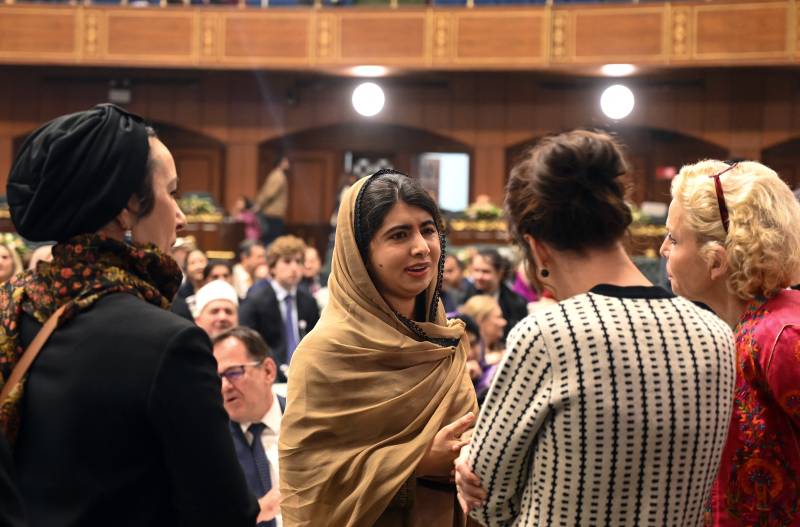Malala attends girls' education conference snubbed by Taliban
Nobel Peace Prize Laureate lands in Islamabad to attend international conference, says she is overwhelmed and happy to be back in her country: Pakistan minister says Afghan govt was invited but Islamabad received no response yet

Stay tuned with 24 News HD Android App

Nobel Peace Prize laureate Malala Yousafzai said she was "overwhelmed" to be back in her native Pakistan on Saturday, as she attended a summit on girls' education in the Islamic world that has been snubbed by Afghanistan's Taliban government.
The summit has brought together education leaders from Muslim-majority countries, but without Afghanistan -- the only country in the world where girls are banned from school.
"The Muslim world including Pakistan faces significant challenges in ensuring equitable access to education for girls," Prime Minister Shehbaz Sharif said at the opening of the summit in the capital Islamabad.
"Denying education to girls is tantamount to denying their voice and their choice, while depriving them of their right to a bright future."
Pakistan Education Minister Khalid Maqbool Siddiqui told AFP that Islamabad had extended an invitation to Kabul, "but no-one from the Afghan government was at the conference".
Muhammad al-Issa, a Saudi cleric and secretary general of the Muslim World League -- which has backed the summit -- said religion was no grounds for blocking girls from school. "The entire Muslim world has agreed that girls education is important, and those who say that girls education is un-Islamic are wrong," he said.
Malala Yousafzai, who was shot by Pakistan Taliban militants in 2012 when she was a schoolgirl, is due to address the conference on Sunday.
"I'm truly honoured, overwhelmed and happy to be back in Pakistan," she told AFP as she arrived at the conference with her parents.
Zahra Tariq, a 23-year-old studying clinical psychology who attended the opening of the summit, told AFP: "At last we have a good initiative on Muslim girls' education."
"Those in rural areas are still facing problems. In some cases their families are the first barrier."
After arriving in Islamabad Saturday morning, Malala Yousafzai said she was "overwhelmed" to be back in her native Pakistan, as she arrived for a global summit on girls' education. "I'm truly honoured, overwhelmed and happy to be back in Pakistan," she told AFP in the capital Islamabad.
Malala Yousafzai was evacuated from Pakistan in 2012 after being shot by the Pakistan Taliban, who were enraged by her activism, and she has returned to the country only a handful of times since.
"I am excited to join Muslim leaders from around the world for a critical conference on girls' education," Malala said on Friday in a post on social media platform X.
"On Sunday, I will speak about protecting rights for all girls to go to school, and why leaders must hold the Taliban accountable for their crimes against Afghan women & girls."
- Focus on Muslim world -
The two-day summit backed by the Saudi Arabia-based Muslim World League will be held in the Islamabad on Saturday and Sunday and opened by Prime Minister Shehbaz Sharif.
It brings together ministers, ambassadors and religious scholars from 44 countries, as well as representatives from the UN and World Bank.
Tens of millions of girls are out of school in Muslim-majority countries, including Bangladesh and Nigeria.
Pakistan is facing a severe education crisis with more than 26 million children out of school, mostly as a result of poverty, according to official government figures -- one of the highest rates in the world.
The summit will confirm "the shared commitment of (the) Muslim community to empower girls through education", according to a government statement.
Malala Yousafzai became a household name after she was attacked by Pakistan Taliban militants on a school bus in the remote Swat valley.
Militancy was widespread in the region at the time as the war between the Afghan Taliban and NATO forces raged across the border in Afghanistan.
Malala Yousafzai was evacuated to the United Kingdom and went on to become a global advocate for girls' education and, at the age of 17, the youngest Nobel Peace Prize winner.
Reporter Rozina Ali/AFP
